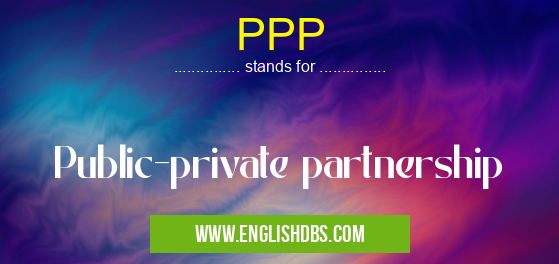What does PPP mean in BRITISH
PPP, or public-private partnership, is a type of collaboration between the public and private sector to address complex issues related to economic and social development. PPPs are focused on the provision of services such as infrastructure, healthcare, and security. The main benefit of these partnerships is that the private sector can provide resources that the public sector may not have access to. Moreover, PPPs enable agencies to focus on core activities while relying on private companies for back-office operations.

PPP meaning in British in Regional
PPP mostly used in an acronym British in Category Regional that means Public-private partnership
Shorthand: PPP,
Full Form: Public-private partnership
For more information of "Public-private partnership", see the section below.
Essential Questions and Answers on Public-private partnership in "REGIONAL»BRITISH"
What is a public-private partnership?
A public—private partnership (PPP) is an agreement between two or more parties from both the private and public sectors in order to achieve specific objectives. The agreement typically provides for each partner's roles and responsibilities in terms of financing, constructing, operating, or maintenance for large projects such as infrastructure or other large services.
What are some benefits of a PPP?
Public—private partnerships can help governments increase service quality by leveraging private sector expertise. They also facilitate access to critical private capital that would otherwise be unavailable to certain government departments or agencies. Furthermore, they can reduce risks associated with government projects by spreading them across multiple partners and providing predictability in terms of cost and delivery timelines.
Who participates in a PPP?
Public—private partnerships usually involve both the public sector (such as local governments), and the private sector (like investors). Additionally, NGOs may be included as third party participants if they are necessary in facilitating project goals.
How do PPP agreements work?
Generally speaking each agreement will specify respective roles and responsibilities when participating in a PPP agreement. For example each party might take all financial risk associated with construction costs in addition to their own contracted role or responsibility; such as developing/ implementing/monitoring particular aspects of the project.
When should I consider using a PPP approach?
You should consider using this approach when you require additional resources which are beyond your organization's capacity — whether financial or operational —in order to successfully deliver your project goals. Also it makes sense if you want access to specialized knowledge or skills through tapping into innovative solutions from across industry sectors.
Final Words:
Public—Private Partnerships are an effective way for organizations from both the public and private sectors to collaborate on large projects that would not be possible without them. This type of collaboration enables governments to leverage resources they don't have access too and encourages innovation through leveraging different industries' expertise in order to complete projects successfully with cost effectiveness and efficiency.
